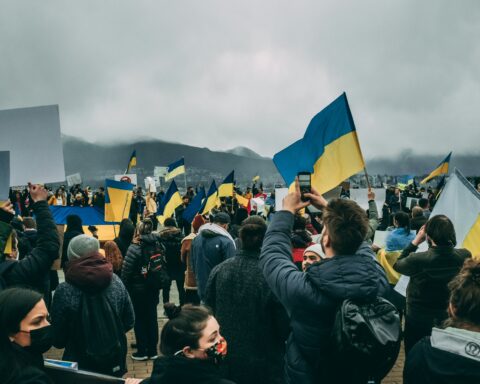On March 16, Crimea will hold a referendum on joining the Russian Federation. The referendum seeks to legitimize Russia’s current occupation. If the referendum in Crimea is free and fair, as verified by international election observers, Crimea should be free to join the Russian Federation. It is already clear, however, that the referendum will be illegitimate.
On February 24, the Crimean Prime Minister recognized the new national government formed as a result of the protests in Kyiv. On February 26, the media began to report that Russian soldiers entered Crimea.
On February 27, professional and heavily armed Russian speaking gunmen seized Crimea’s parliament. Under siege, the Crimean parliament approved a no-confidence vote and unconstitutionally appointed the head of the Russia Unity party as Prime Minister. On February 28, the full scale occupation of Crimea began and Russia soon gained full scale operational control of the peninsula.
On March 6, the Crimean parliament approved the referendum on the future of Crimea. A recent poll shows that only 41% of Crimeans wish to unite with Russia. Just as the Crimean parliament elected the Prime Minister under the barrel of a gun, the Crimean people will vote to join Russia under the barrel of a gun.
A clean break
Already there are signs that international observers will not be able to monitor the referendum. Journalists have not been allowed in Crimea since March 1. On March 4, the Senior UN Envoy was threatened by a group of 10 to 15 gunmen and cut his mission short. On March 6, the Organization for Security and Cooperation in Europe (OSCE) cancelled its military observer mission as the observers were not granted access.
Putin understands the significance of the current events. Unlike 2004’s Orange Revolution, the ousted government’s actions resulted in the death of 100 people. This left such a deep wound on the Ukrainian psyche that there was a clean break with the old political guard.
Putin’s pretext for occupying Crimea is that he is defending Russian citizens. This is a thin excuse. Crimea has an ethnic Russian majority and the Crimean constitution protects Russian as a language. Putin also hasn’t shown much concern for the actual Ukrainian and Crimean Tartar (Sunni Muslim) minorities.
The conventional thinking is that this pretext allows Putin to protect his interests in Russian naval bases in Crimea. These bases give Putin access to the Mediterranean, like the old Soviet naval base in Tartus, Syria, for example.
New narrative
But potentially there is a darker and more troublesome narrative: having consolidated control of Russia, Putin is beginning to believe his own propaganda. Putin styles himself as a modern Tsar Nicholas I. He wishes to develop a stronger sense of religious and national identity within Russia to act as a counterweight to the West’s liberal ideologies.
Ukraine was the cornerstone of Putin’s Eurasian Union. The Union was an effort to restore some of the glory of the Soviet Union, whose collapse Putin called the greatest geopolitical tragedy of the 20th century. Under such a narrative, Putin genuinely believes that he is saving Ukrainians from a mob of fascist and neo-Nazi protestors. Putin may not stop in Crimea. He may also attempt to gain control over Eastern Ukraine.
Tactically, Putin is drawing firm red lines. Crimea is under Putin’s control unless he decides to back down – he has the initiative.
By contrast, the West’s response has been hesitantly reactive. In 1994, Russia, the United States and the United Kingdom signed the Budapest Memorandum on Ukraine’s denuclearization. By signing that document the West committed to respecting Ukraine’s territorial and economic sovereignty.
Since then the West has mostly ignored Ukraine.
Instead, Russia has kept Ukraine on a tight economic leash through reliance on gas subsidies. Had the West truly enforced the Budapest Memorandum, Ukraine could have slowly drifted out of Russia’s economic orbit over the last 20 years.
Western credibility on test
Unfortunately, inaction manifested itself into the Crimean crisis. The stakes are high. Instead of economic assistance, Western values and credibility are now on the line. The crisis serves as a reminder that in geopolitics tension builds over long periods of times and often snaps in large and unpredictable ways.
Consider the current nuclear agreement under negotiation with Iran. How will Iran respond if it sees that the West does not enforce its nuclear agreements over time? Or take China. If tensions flare between China and Taiwan or Japan, the Crimean crisis will serve as a modern precedent.
The Crimean referendum will not be legitimate. For Putin to drop the narrative that Crimea is willingly joining Russia, the West must threaten sufficiently large consequences. If a diplomatic solution is not reached and action is limited to economic sanctions, Putin may become isolationist. This may embolden him to make additional land grabs in former Soviet territories.
To prevent this, the West should signal that if Crimea illegitimately joins Russia, the rest of Ukraine will accede to NATO.
Threatening to put NATO on Russia’s border increases the pressure on Putin to work within a credible international law framework.
As a worst case scenario, after secession, it limits Putin’s land grab to Crimea. It demonstrates that the West enforces its international agreements.
Prior to World War II, British Prime Minister Neville Chamberlain signed the Munich Agreement which allowed Germany to annex the Sudetenland. Then in opposition, Winston Churchill issued sharp criticism. He said: “You were given the choice between war and dishonour. You chose dishonor and you will have war.”
The West now faces the same choice. To prevent war it must signal that it is ready for it. NATO must allow Ukraine to accede as a consequence of illegitimate Crimean secession. Otherwise, the West may again lose the initiative on the crisis. The consequences of which would be large and unpredictable.
Mark Semotiuk is a Fordham University Law Student currently studying European Union Law in Paris at Pantheon-Assas (Paris II). Mr. Semotiuk has been an international election observer in Ukraine on multiple occasions. He can be reached at [email protected].





